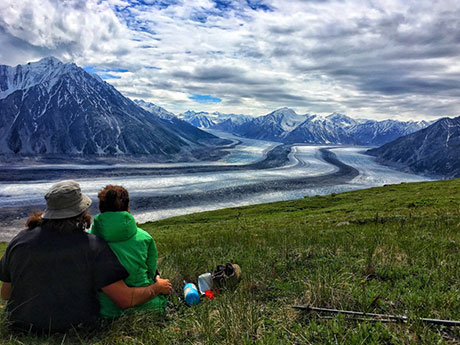The Odds are Good, But the Goods are Odd
Posted June 24, 2020 at 9:04 am by Tim Dustrude

Photo by Marc-André
FREEZER BURNED: Tales of Interior Alaska is a regular column on the San Juan Update written by Steve Ulvi…
In case you have never heard this pithy phrase describing a single woman’s chances of meeting Mr. Normal in Alaska, I did not come up with it. Some form of this lament surely has echoed everywhere along historical flood tides of frontier expansion in America. After all, we call it Manifest Destiny.
In the early 1970s (pre-pipeline) the population of Alaska climbed, ignited by WWII road connection with the Outside and continued military spending, but was only about 375,000 with about 46% of that number living in Anchorage. Alaska is a muscular 16% of the entire land mass of America and at that time claimed less than .2% of the national population. Little has changed in the last five decades with those relative numbers but today Wyoming, Vermont and North Dakota each have smaller populations, but combined are 400,000 square miles smaller that Alaska.
In the minds of adventure seekers, people not of their own generation who ache for personal renewal far from the madding crowd of post-modern America, bush Alaska is the real Alaska. The many “show me the money” immigrants, salivating about the lure of big wages and an annual Permanent Fund Dividend check for each and every resident, are mostly carpet baggers. Then there are the hordes of military families posted to Alaska who return south at the earliest transfer. As a result, there is a heady mix of delusion and self-promotion in the image, as ardently portrayed by most urban Alaskans, that the entirety of the vast Alaska landscape qualifies as “The Last Frontier”.
With a population density of roughly 50 people per 1,000 square miles amid a vast, roadless wilderness, the bush is a world apart from urban Alaska. Along the stretch of the Yukon that I know, each guy or couple residing out in the woods claimed informal occupation and use of an area, that in comparison to here, would equate to one residence in an area larger than the entirety of San Juan Island. So, it follows that the arrows of a frost-bitten Cupid have very few human targets of opportunity to begin with.
So outside of the tyranny of low numbers, why are the odds so slim with regard to finding that special someone in bush Alaska? In what ways are the “goods odd” with men (and a few women) who march to a different drummer and seek to live in anachronistic ways in the north woods? One of the only hopes some guys have is that they will attract the eye of a new teacher with manly charm and good deeds. Maybe even a bath and a trim. Given frequent resignations, new bush teachers are predominantly younger women, bravely stepping off the mail plane in late summer, blinking in the strong subarctic light. Some guys went into Fairbanks and used University of Alaska connections to meet women interested in bush life. Sometimes companionable love ensued.
The challenges of living out and away from towns and villages generally means even fewer modern amenities. Alright, more like none. Personal hygiene, staying informed and controlling bad habits takes a lot of work anywhere, but there are few folks around to even notice that a person is getting a touch weird. “Gettin’ bushy” is a reaction to extreme social distancing and is decidedly unhelpful in finding companionship.
Finding a relationship in a small town or village of 120 souls with two dozen more scattered out along the river, can be fraught with unusual challenges. Of course, there were plenty of affairs, dissolutions, odd threesomes, some actual mail order brides, gay couples, differences of 20 plus years in age, as well as the notable instance of a guy making off with a woman while her bearish husband was locked in the town well house. This novel strategy allowed for a romantic escape by dog team to a remote cabin for a month or two. But they had to come back to town sooner or later, so there was more to this particular drama.
However, becoming exceptionally bushy takes its finest form in single men who were maybe a brick short of a full load at the outset. Most of us were misfits of sorts; square pegs in life’s round holes, etc. Believe me, a lot of time alone in the woods can bend or even shatter reality in somewhat normal fellows, too. But a few guys seemed bent on participation ribbons, if not full recognition, in the Darwin Awards.
Shabby Charlie lived as though it was still the era of Rocky Mountain fur trappers. Calling him a minimalist doesn’t do the term justice: he spent decades of winters living up a remote river using slumping old cabins with little more than a rusty rifle, several mangy dogs, animal skin clothes, a couple pots and pans, a bag of beans, a lot of steel traps and plenty of grit and determination. Barefoot in summer with broken toe nails and thick sole pads like leather, no bug dope or netting with hordes of mosquitos, sleeping curled under a tree and wearing stained levis that could stand up alone in a corner, was his chosen way year after year.
The cycle of his seasons was a throwback to gold rush stories. After doggedly working a trapline all winter in isolation, he would make his way to distant Fairbanks with a few thousand bucks of fur money wadded in his pockets, to spend night after night at a strip club drinking and tipping the gals who were glad to relieve him of his cash. Inevitably he found his pockets emptied. Charlie then made his way back to the banks of the Yukon to pass time around the tiny town. He startled many polyester-clad tourists, stepping down from their large RVs ready to click a couple of destination photos of the Yukon after enduring 160 miles of washboard and dust. Many had the memorable experience of seeing Charlie rise like a grubby apparition from a pile of rags under a picnic table, squinting through the fog of a hangover into the glaring midnight sun.
Charlie was practiced at swapping stories for free drinks and could smell an uncorked whiskey bottle from a hundred yards off. He also had a cringe-worthy habit of re-chewing snoose until he could buy another can. I came to know his unsettling habit of identifying people approaching his camps by looking at them through his rifle scope. He would make some money, often at a gold mine near his fish camp, wading into the ice-cold water pouring through a large steel sluice box, barefoot, to toss out larger rocks for hours at a time. He then bought basic supplies and bummed a boat ride 40 miles back upriver to then line his loaded canoe 50 miles up to his winter cabin before the ice began to flow.
Stan the Man lived simply in town after failing to establish a life out on the river. A large fellow with gentle eyes and demeanor, he expressed faith in Christ with anyone who would listen. He developed a paranoia about neighbors living on small adjacent lots. He meticulously lined his cabin walls with aluminum foil to block mind-altering rays of some kind that he was convinced were aimed his way by a particularly vexing neighbor. He often set up battered lawn chairs in his tiny, cluttered yard in the heart of town next to a very dusty street, to read from his bible for a handful of curious tourists looking for salvation amid their Alaska travels.
Dump Dave was said to be an army vet who pushed the envelope of being an “end of the roader”. He just appeared one day and made camp in a copse of poplars very near the town dump off the grass airstrip. A busy area in a quiet little town. This seemed odd since he suffered from anti-social demons. After minor (and mostly imagined) transgressions, he would begin shouting and fire off his rifle at the roar of aircraft taking off or chainsaw use nearby. One day he shot up a fabric-covered Super Cub airplane tied down along the airstrip in retribution for some imagined threat. State Troopers flew in a couple days later to take him away for evaluation. A month later, with winter coming on, he was back, to the consternation of all.
But once again isolated and shunned, his lack of medications, grossly inadequate diet and aroused inner demons drove him to slip away to relocate to a crude tarp covered lean-to along the shore with the lapping of the Yukon just yards away. A long stone’s throw from my cabin and young family. As one might expect given his diet of ravens and squirrels, general malnutrition and repeated serious frost bite to his feet, he became sadly untethered. Eventually folks convinced the Troopers to come for him again just as a vigilante group was planning to visit him to enact frontier justice if he again threatened anyone. He lost parts of his feet and spent months in treatment. We later heard on the radio that he shot at State Troopers in a mindless standoff along a busy highway near Fairbanks. Unhurt, he was arrested and eventually convicted and sentenced to some years behind bars to our great relief.
Locals said that Little Joe was another wanderer who just seemed to appear in town from the road system. He timidly hung around the edges of things. There were short-term, cash jobs for any folks willing to work, but supporting himself didn’t seem to be among his goals. But even in a dry town if a couple of guys come up with the money, booze could be had from a bootlegger. One evening of cheap whiskey and cards in the cabin of the town drunk by the boat landing, ended in tragedy. In a boozy lamplit scene, Little Joe of frail build felt threatened by a burly young fellow, arguing ensued and devolved into a deadly shooting. The drag marks down to the waters edge were clear but the body was not found until the river dropped in the fall when a dog dug into the silt. Self defense prevailed and after a short time behind bars, Little Joe returned to live in exile in a filthy trailer, with a couple large dogs and no social life.
Another young fellow, called John the Baptist, was said to have strident religious inclinations, seemed resolute to meet his maker, and succeeded in doing so by starving to death in his sleeping bag during his first winter of wilderness living. He had few possessions and apparently no one knew his last name or place of origin. His pants and other useful items were scrounged by the practical fellows who found him frozen stiff in his sleeping bag in the small cabin they had suggested he occupy several months prior. For some family somewhere, John X had disappeared without a trace forever.
At the mouth of that same tributary river a skinny, shifty-eyed fellow called Dirty Fred by friends, occupied a small dingy cabin off and on, and other than a disdain for wage-earning work, being in town or bathing, was known for concocting a bucket of home brew and laying in the rack, sipping it green through a hose until finding the bottom. Hallucinogenic drugs kept him from going around the bend I guess, but spawned some poorly thought out actions. One crisp fall, burley, camo-clad moose hunters from Anchorage returned to their fully stocked camp near his remote cabin and suspected pilfering. What kind of varmint focuses on booze? They set up and soon caught Fred sneaking into their camp like a shabby Gollum to steal from their lavish stores. At gunpoint they knocked him around pretty good, lashed him to a spruce tree and spent days loudly debating his future. Shaken, dehydrated, welted by mosquito bites but undaunted, Fred managed to escape one evening and lay low until they decamped and left the area.
I thank my lucky stars that in 1974 my Corvallis girlfriend, Lynette, was plucky enough to sojourn north to the Yukon wilds packed in an old truck with four wild-eyed guys, and grounded enough to stay with me through thick and plenty of thin. We tied the knot after a couple of years, were blessed with two children and moved on to the outskirts of Fairbanks after 17 years around Eagle on the Yukon. After another 17 years of northern living, she reluctantly joined me to retire here and build our “last homestead”. I often remind her-only half in jest- that “I will never forgive her for putting up with me for so long.”
(next: The Kings of the Yukon River)
You can support the San Juan Update by doing business with our loyal advertisers, and by making a one-time contribution or a recurring donation.
Categories: Freezer Burned, People
One comment:










One comment...
I’m so glad I didn’t read a report like this before I went to Alaska in the summer of ’59 to begin my teaching career in a little town named Glenallen. While there I met a handsome (and very clean) young man serving with the army corps of soldiers, the Alaska Communications System. Long story short, we were married in July of 1960 and spent almost 50 wonderful years together until he died in 2010. I’ll always think of Alaska with fondness for giving me the best gift I ever received!
By submitting a comment you grant the San Juan Update a perpetual license to reproduce your words and name/web site in attribution. Inappropriate, irrelevant and contentious comments may not be published at an admin's discretion. Your email is used for verification purposes only, it will never be shared.